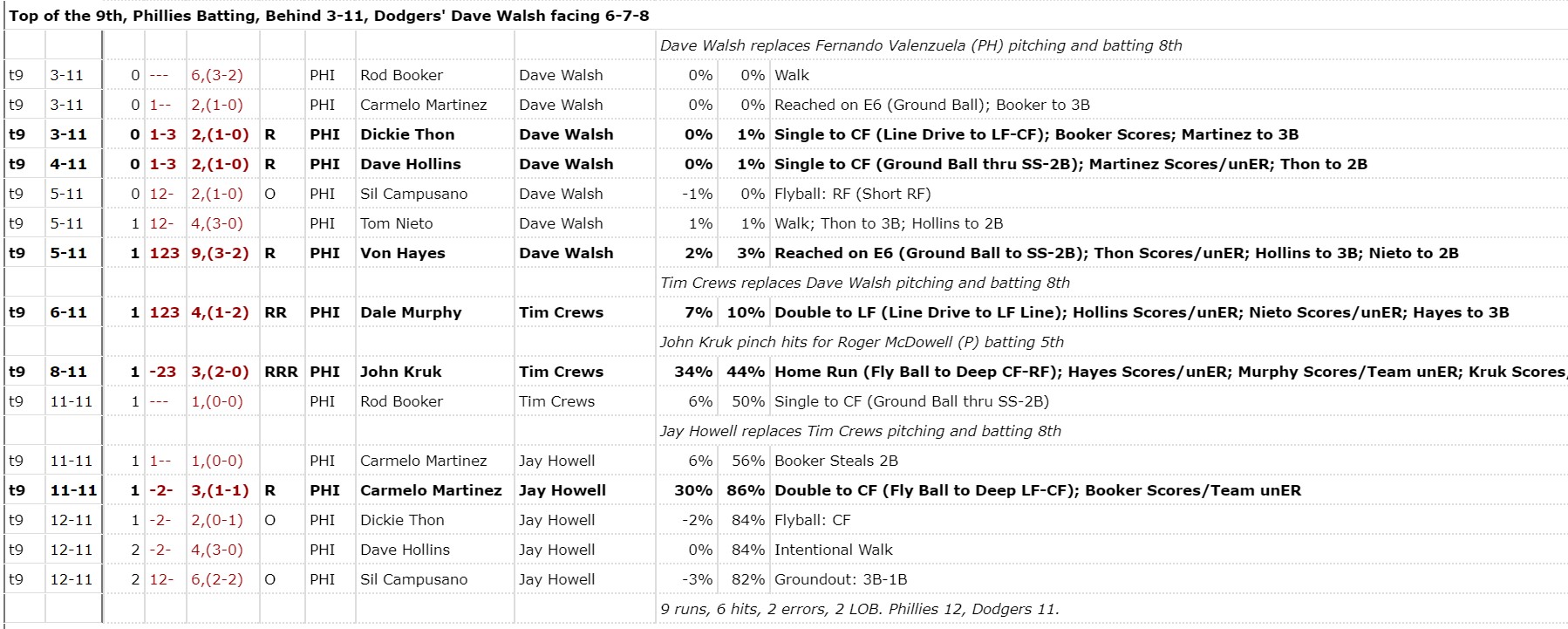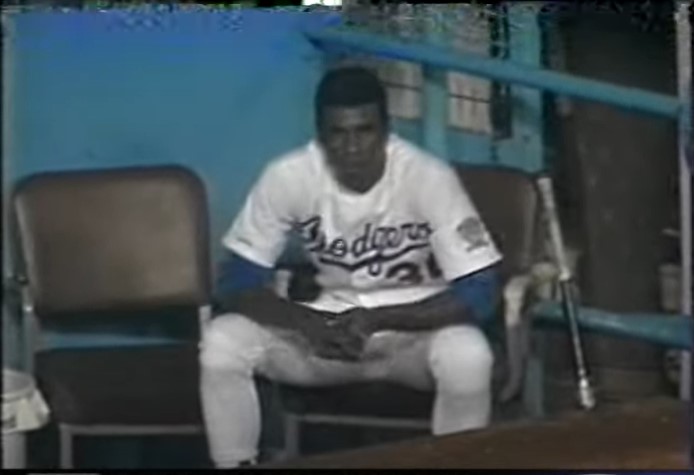On August 21, 1990, I went to a baseball game with a friend. And I stayed for about seven innings, and then we left early.
I don’t think we thought twice about it. It was a weeknight. We had jobs.
And the Dodgers were winning, 11-1.
To say the least, this score more than satisfied the formula I described within an early Dodger Thoughts post defending Dodger fans: [margin of the lead] – [number of innings remaining] > 4. It doesn’t mean you hate baseball or you’re an unworthy fan if you bargain your way into an easier drive home and a bit more sleep.
It does mean that once in a while, you might miss an exciting finish. And boy, did we miss a doozy. (Well, actually we didn’t, since it was still going on by the time we got home.)
The Phillies scored two runs in the top of the eighth inning and nine in the ninth, rallying to beat the Dodgers, 12-11.
Mathematically, this was the second-most stunning comeback in MLB history, according to Baseball-Reference.com, surpassed only by a 1952 game in which the Reds had a 8-2 lead with two out and the bases empty in the ninth. But we’re splitting graying Tommy Lasorda hairs, here.
The Dodgers had an 11-3 ninth-inning lead … and lost.
Let’s spend a quick moment on how the Dodgers built that lead. After going ahead 3-1 in the third inning on Mike Scioscia’s two-run single, the Dodgers broke it open with a massive inning of their own, scoring eight in the fifth. Scioscia drove in two more runs with a double, and with the aid of two Phillies errors, Los Angeles kept poking across baserunners. For the game, the Dodgers had 20 baserunners but only two extra-base hits, both doubles.
Feeling comfy, Lasorda started emptying his bench. Kal Daniels and Eddie Murray were gone before the top of the sixth began, along with rookie starting pitcher Mike Hartley (six innings, one run). Scioscia, Kirk Gibson and Hubie Brooks followed an inning later, along with one other player. Alfredo Griffin was replaced at shortstop by 21-year-old rookie José Offerman.
Many of you reading this will have a certain opinion of Offerman, but keep in mind that at the time, he was a major, major prospect. Only two days earlier, he had made his big-league debut by going 3 for 5 with a stolen base and a home run in his first career at-bat. That was after coming up with a .326 batting average, 11 triples, 71 walks and 60 steals for Triple-A Albuquerque. Offerman was, by every expectation, the shortstop of the coming decade for the Dodgers.
So there was no reason for Lasorda or Dodger fans to have any misgivings. Even after Don Aase allowed a two-run double to Von Hayes in the eighth, vibes were strong. Fernando Valenzuela pinch-hit for Roger McDowell in the bottom of the eight and drove a clean single to left-center field.
Lasorda handed the ninth inning to Dave Walsh, another rookie who had made his debut six days before Offerman. With the eight-run lead, Walsh walked the leadoff batter, Offerman bungled a potential double-play grounder and the collapse was on.
Walsh got an out and still had a six-run lead when Offerman made a second error, handcuffed on what could have been a game-ending double play. Tim Crews replaced Walsh and was hammered: two-run double smoked down the left-field line by Dale Murphy, and then a three-run homer by pinch-hitter John Kruk to tie the game at 11.
It was such an epic turnaround that I was already in front of the TV before it was over.
“I screwed up the game,” Crews later told Bill Plashcke of the Times. “What can I say?”
Not even closer Jay Howell, whose ERA was 2.47, could solve Philadelphia. With a runner on second, Carmelo Martinez crushed a double to left center, bringing home Rod Booker with his second run of the inning to put the Phillies ahead.
There was still only one out, but Howell retired two of the next three batters to leave the Dodgers hope of salvaging this one. Despite a one-out single by Stan Javier, neither Mickey Hatcher nor Chris Gwynn could advance him, and this one fell into ignominy.
“I’m in shock,” Lasorda told Plaschke. “First time, first time I’ve ever seen anything like that in the ninth inning. Eleven to one. Eleven to one. I don’t believe it.”
Said Phillies manager Nick Leyva: “I’ve never seen anything like it. I don’t think I’ve even heard of anything like it. They kept making bad pitches, and we took advantage of it.”
And I still say I was there, even if I wasn’t entirely there.







Comments are closed.